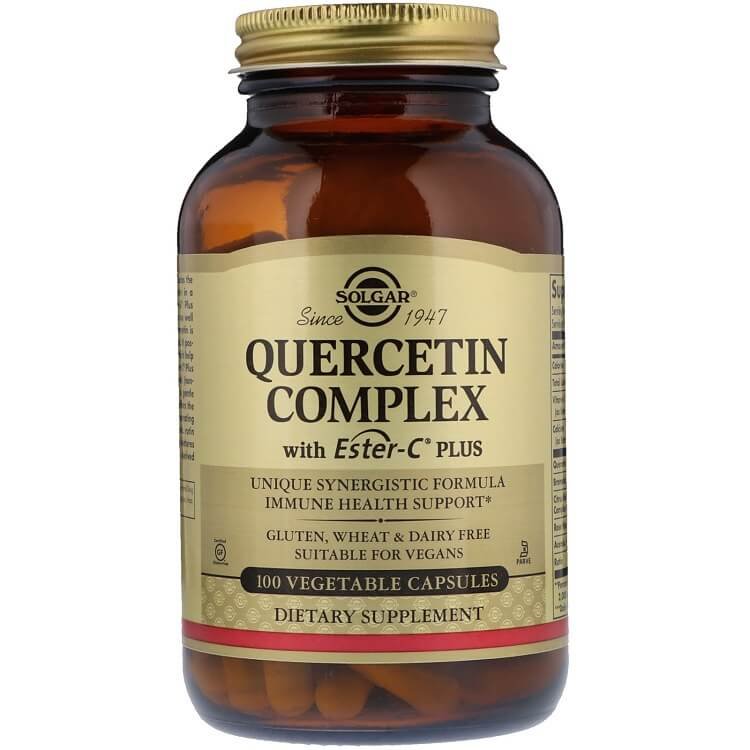I wanted to briefly write about quercetin, a plant compound found in small amounts in many fruits and vegetables. Quercetin is a potent antioxidant and in the past has been a supplement frequently taken for allergies to reduce histamine levels. Interestingly, quercetin also has potent antiviral benefits, which is why it has recently become quite a popular supplement.
Quercetin is not a new or experimental supplement. It has been used for many years and has an excellent safety profile.
Research has shown that quercetin helps to prevent viruses from being able to enter and infect cells as well as slowing viral replication, and has been studied with a number of different serious viruses with good results (it was even researched with the Ebola virus back in 2016). Even though Covid is what’s foremost on everyone’s radar at the moment, it is not the only respiratory virus going around this year. I know several different people who were quite sick this year, but had negative Covid PCR tests; I only mention that because just like any other year, there are a host of viruses going around this winter, not just Covid, so doing what we can to stay healthy is always a good idea.
Dr. Paul E. Marik, MD, chief of pulmonary and critical care medicine at Eastern Virginia Medical School in Norfolk, Virginia spoke about quercetin, saying "If you have something that is potentially beneficial, safe, and cheap, what do you have to lose?"
One of the reasons that quercetin may be beneficial against Covid and other viruses is that it may help to reduce viral load, making illness easier for the body to fight off. Our bodies are constantly fighting off invading viruses that we come in contact with as we go about our daily lives. If our body’s immune system is able to fight off those attacks, we stay healthy; it’s when the body is overwhelmed by those invading viruses that we fall ill. Research has shown that quercetin is able to help prevent viruses from replicating and infecting cells, and those benefits have been shown in both in vitro and in vivo studies for a variety of viruses including the common cold. Let me be clear, quercetin is not a magical cure for anything, but I do believe it can help our immune systems to work better to fight off whatever viruses we may come across.
Interestingly, it’s been found that vitamin C increases the effectiveness of quercetin and vice versa, so it's a smart idea to take those two supplements together.
It’s a supplement with good science behind it, and something that has been shown to be safe to take and has been used for many years, so I’d recommend adding it to your supplement regimen this winter along with Vitamin D, Zinc, and Vitamin C.
Vitamin D is a vitamin that’s made in our skin in response to sunlight, but most people are not getting much sun on their skin in the cold weather, which is why our vitamin D levels are usually a lot lower in the winter. Research on Covid patients has found that people who had the lowest levels of vitamin D levels had much more severe illness, which no one wants, so supplementing is a simple way to keep yourself healthy (it’s a tiny, inexpensive pill). Vitamin D is also helpful for bones and calcium absorption, so it’s always a favorite supplement of ours.
Zinc is a mineral that’s also great for the immune system, and most people aren’t getting nearly enough zinc in their diets. Zinc has been shown in research to have a protective effect against respiratory viruses but it also appears to have a regulating effect on the immune system, helping to prevent inflammation and also helping the body’s response to the Coronavirus and other viruses.
Vitamin C helps to enhance immune cell functioning, and we especially recommend the Ester-C form since it has been shown to stay active in the body longer that regular vitamin C. It’s also a non-acidic form of vitamin C that’s gentle on the stomach. The majority of people who had severe Covid symptoms, including critically ill patients, were low in vitamin C. Vitamin C is easily obtained from fresh fruits and vegetables, but unfortunately most American diets are not getting the recommended amounts of fresh product every day, so supplements can be helpful.
Keep in mind, we are not physicians, but each of these supplements has been used for many years to help with immune health, which is even more important this year.


